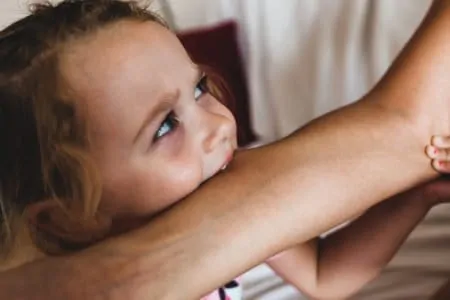It is easy to confuse authoritative and authoritarian parenting. The words sound nearly identical, and both philosophies place authority at the center of the family dynamic.
However, the execution makes a world of difference. While both styles rely on high standards, the way parents enforce rules and connect with their children creates two very different childhood experiences.
Authoritative vs. Authoritarian Parenting
Authoritative and authoritarian parenting share high expectations, but they differ significantly in warmth and responsiveness. Authoritative parents combine high standards with emotional support and open communication. In contrast, authoritarian parents demand blind obedience with little warmth or room for negotiation.
Defining Authoritative Parenting
The authoritative parenting style is often considered the gold standard by child psychologists. These parents are strict and maintain high expectations, yet they remain nurturing and responsive.
Psychologist Diana Baumrind, who defined these styles, described authoritative parents as those who balance high demands with high responsiveness. They set clear rules but explain the “why” behind them. They are willing to listen to their child’s viewpoint and may modify expectations if the situation calls for it (1).
How It Works in Practice
Imagine a child refuses to go to bed at the assigned time.
An authoritative parent asks why. They listen to the child’s explanation and validate those feelings. After the conversation, the parent makes a decision based on logic and empathy.
If the child just wants to stay up to play, the parent holds the boundary firmly. They explain that sleep is necessary for school the next day and enforce the bedtime.
However, if the child feels unwell or is anxious, the parent adapts. They might check for a fever or allow the child to read quietly for 15 minutes to wind down. The authority remains, but it is flexible and human.
Defining Authoritarian Parenting
Authoritarian parenting is equally strict regarding expectations and standards. However, the approach to discipline and connection is starkly different.
Authoritarian parents value blind obedience above all else. They score high on demands but low on responsiveness. There is little warmth, and negotiation is generally off the table. The classic phrase for this style is, “Because I said so.”
How It Works in Practice
Let’s look at the same bedtime scenario.
An authoritarian parent does not ask why the child is refusing sleep. They view the refusal as defiance. The parent orders the child to bed immediately, expecting compliance without question.
If the child protests, the parent moves quickly to punishment or shouting to re-establish control. The child’s internal state, whether they are sick, scared, or just not tired, is rarely considered relevant.
Comparing the Two Styles
While both styles want well-behaved children, the methods vary wildly. Here is how they stack up against each other:
Parental Warmth and Affection
The emotional climate of the home differs greatly between these two approaches:
- Authoritative parents are visibly affectionate: They offer hugs, praise, and emotional support. Even during discipline, the underlying tone is one of care.
- Authoritarian parents are emotionally distant: They may view affection as a weakness that undermines their authority. They rarely express love verbally or physically, especially when rules are broken.
Communication Style
The flow of information dictates the relationship dynamic:
- Authoritative parents use two-way communication: They actively encourage their children to speak up. They listen to feelings and validate them, even if they don’t change the rule.
- Authoritarian parents use one-way communication: The parent speaks, and the child listens. Discussion is often viewed as backtalk or disrespect. It functions more like a dictatorship than a partnership.
Rule Setting
Rules exist in both households, but their implementation varies:
- Authoritative rules are reasonable and explained: Parents ensure the child understands the reasoning behind a boundary. They are willing to adjust rules as the child matures.
- Authoritarian rules are absolute and unexplained: The rules are arbitrary and strict. Parents expect blind obedience and offer no justification other than their status as the parent.
Discipline vs. Punishment
How parents react to misconduct defines the child’s learning experience:
- Authoritative parents use discipline to teach: Consequences are logical and related to the behavior. The goal is to help the child learn self-regulation.
- Authoritarian parents use punishment to control: Punishment is often harsh, arbitrary, or shaming. The goal is to inflict enough discomfort that the child is afraid to disobey again.
Freedom and Independence
The ultimate goal of parenting is to raise a functioning adult, but the path there looks different:
- Authoritative parents encourage independence: They give children choices within safe boundaries to help them develop problem-solving skills.
- Authoritarian parents restrict independence: They control every aspect of the child’s life, leaving little room for the child to make choices or learn from natural mistakes.
Here is a quick reference chart to help you spot the differences:
| Feature | The Authoritative Parent | The Authoritarian Parent |
| Standards | High Standards | High Standards |
| Emotional Warmth | High Warmth: Nurturing, affectionate, and supportive. | Low Warmth: Cold, distant, and critical. |
| Communication | Two-Way: Listens to the child and invites discussion. | One-Way: Commands are given; obedience is expected. |
| Flexibility | Flexible: Willing to negotiate rules when appropriate. | Rigid: Rules are set in stone and rarely explained. |
| Discipline Focus | Teaching: Focuses on learning and future behavior. | Punishment: Focuses on payment for past mistakes. |
| Control Style | Collaborative: Guides the child toward self-regulation. | Dominant: Controls the child through fear or power. |
A Note on Nuance
Parenting is rarely black and white. While parenting styles impact child development, they are not the only factor. A child’s inherent temperament, peer groups, teachers, and environment all play massive roles.
Do not panic if you see glimpses of yourself in the “wrong” column. No parent is perfect, and consistency matters more than a single bad day.
Outcomes of Authoritative Parenting
Decades of research suggest this balanced approach yields the best results for most children.
Children raised in authoritative homes generally exhibit:
- High emotional intelligence: They learn to manage their feelings and empathize with others.
- Strong self-confidence: Because their opinions are valued, they trust their own judgment.
- Academic success: Support combined with high standards creates an environment ripe for achievement.
- Better social skills: They tend to be more cooperative and popular among peers (2).
Outcomes of Authoritarian Parenting
Authoritarian parenting might produce obedient children in the short term, but the long-term effects can be damaging.
Children raised in authoritarian homes may experience:
- Lower self-esteem: Constant criticism and lack of validation can make them feel unworthy.
- Aggression or rebellion: Some children eventually rebel against the strict control, leading to high-risk behaviors in adolescence.
- Poor social skills: They may struggle to function in situations where they must make decisions without an authority figure giving orders.
- Mental health struggles: Studies link this style to higher rates of depression and anxiety (3).
- Lack of self-control: Because they never learned to self-regulate, they may act impulsively when the parent is not present (4).
Choosing the Better Style
While cultural context plays a role, the consensus among child development experts is clear. Authoritative parenting is generally the superior approach for fostering healthy, independent, and well-adjusted adults.
Psychologists note that children from authoritative homes learn strong self-regulation. They achieve more academically and report higher levels of happiness. The only real downside is the effort required; it takes much more patience to explain a rule than to simply shout, “Do it now!” (5).
Applying Authoritative Strategies
If you want to shift your parenting style toward a more authoritative approach, try these actionable tips:
- Listen first: Before reacting, give your child a chance to explain their perspective.
- Explain the “Why”: Help your child understand the safety or logic behind your rules.
- Validate feelings: You can accept a child’s anger or sadness while still enforcing a boundary.
- Offer choices: Give your child small freedoms, such as choosing between two outfits or two vegetables for dinner.
- Focus on discipline: View mistakes as opportunities to teach, not reasons to punish.
- Let them fail: Allow natural consequences to happen so your child learns responsibility.
- Be consistent: Follow through on what you say so your child learns to trust your word.
FAQs
Your Best Is Good Enough
Parenting is a journey, not a destination. If you realize you have been too strict or too distant, it is never too late to pivot toward a warmer, more authoritative style.
Focus on connection over control. Listen more, explain your reasoning, and give yourself grace when you slip up. You are doing your best, and that effort matters more than perfection.






